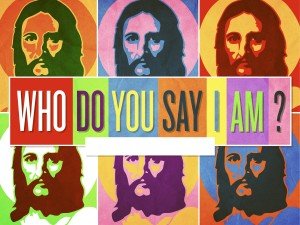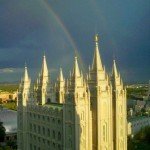I was asked to speak in my ward on Sunday for Mother’s Day. I actually like pubic speaking and enjoy preparing talks. However, this talk was particularly hard to write. All week I felt the pressure to be perfect and to give a perfect talk or risk offending someone in the ward. Throw in some social media drama (not of my making) and I was on my way to a nervous breakdown by Saturday night. I prayed a lot to try and find some peace and I had a break through on what to talk about and how to say it. “Just testify of the gospel and share your testimony for the uplifting of the sisters in your ward who are struggling with heavy burdens.”
Tag Archives: Scriptures
No Doubt to Know
 Trying to find a way with Scriptural understanding to reconcile the honest search for Truth and the spiritual destructiveness of unbelief, I found that doubt is not a positive attribute. As described by prophets and the Lord Jesus Christ, doubt is the enemy of faith. Unbelief is slightly worse because of a more concrete condition of the mind and heart, but they are both related to each other. Doubt doesn’t lead to faith. It destroys it by leading to questioning everything; even miracles that we participate in by the Grace of God.
Trying to find a way with Scriptural understanding to reconcile the honest search for Truth and the spiritual destructiveness of unbelief, I found that doubt is not a positive attribute. As described by prophets and the Lord Jesus Christ, doubt is the enemy of faith. Unbelief is slightly worse because of a more concrete condition of the mind and heart, but they are both related to each other. Doubt doesn’t lead to faith. It destroys it by leading to questioning everything; even miracles that we participate in by the Grace of God.
The one instance when doubt brought greater understanding was Acts 10:17 after Peter received his vision of the unclean animals. Religiously speaking, it was a weak doubt because he had complete confidence the vision was real. He simply wondered, “what this vision which he had seen should mean,” and pondered for an answer. His faith in the vision was rewarded with a missionary opportunity to baptise a gentile. He then realized in Acts 10:28 that, “it is an unlawful thing for a man that is a Jew to keep company, or come unto one of another nation; but God hath shewed me that I should not call any man common or unclean.” The use of the word “doubt” in this instance might be the wrong choice of words, when “wondered” might be more appropriate.
Despite modern definitions and meanings, to doubt is not the same as questioning. It is natural and even required by Scripture that we should question. No one can discover truth without inquiring with mind and spirit where it can be found. How we are to question is important to properly growing in faith. There is a form of action involved that goes beyond the intellectual curiosity. It reads in 1 Thes. 5:21 that believers should, “Prove all things; hold fast that which is good.” As always, Jesus Christ explained how this is to be done while teaching at the Temple. His teachings became a source of astonishment to the people attending because he had no formal intellectual training. They asked him how he could know so much without the proper school education and he responded in John 7:16-17 that, “My doctrine is not mine, but his that sent me,” and “If any man will do his will, he shall know of the doctrine, whether it be of God, or whether I speak of myself.” He is teaching that the way to discern spiritual things is to follow what God has already taught. This idea is emphasized in verse 19 when he asks, “Did not Moses give you the law, and yet none of you keepeth the law? Why go ye about to kill me?” Those who do not follow the basic teachings of God cannot comprehend deeper truths and will be stuck with their questions. Continue reading
The Order of the Relief Society
This is the final in a series about Mormon Priesthood theology and development. The others can be read here, here, and here although this one is about the Relief Society. No discussion about the Priesthood is complete without a mention of this organization of women.
The Gospel of Jesus Christ is for everyone, regardless of birth and station in life. A person does not even have to belong to the Church for the atonement to help in repentance and answers to prayers. The formation by the Lord of The Church of Jesus Christ of Latter-day Saints is to have an authorized organization to spread the Gospel and administer the ordinances of Salvation and Exaltation. Church is where the Priesthood is gathered for administration of those ordinances that include baptism and Temple work. For Mormonism, those who do not have the Priesthood are without authorization to administer those ordinances. For believers, Joseph Smith restored the ancient covenants and authority that had been lost since the time of the Apostles. No person or group can claim having the Priesthood unless they can prove an unbroken line directly to Joseph Smith and those he ordained. A revelation to those already in authority or a visit by angels are the only ways those who were not allowed the Priesthood can receive it. What the Lord takes, He can give. What He gives can be taken away, such as Israel in the days of Moses. The Priesthood is forever. Any mortal person’s right to it is not.
When the Priesthood was given to Joseph Smith, the Lord gave it to men and not women. The Scriptures and history indicates it has been that way from the days of Adam and Eve. Men have been tasked with leading the Church and giving the ordinances. It is an awesome responsibility that has not always been appreciated. Sad experience has proven that not all men are worthy of wielding such a precious and powerful tool. Other than the Lord Jesus Christ, no one on Earth is perfect. That is why there is a need for the atonement. Both men and women can partake of this divine gift and prepare for greater blessings. Women may not have the Priesthood as currently understood, but the Lord has provided them with their own authority and responsibility to work along side the Priesthood structure. The Relief Society is much more than a gathering of women in Church. Fully utilized, it can be a powerful influence for good, or as Emma Smith put it, “something extraordinary.” Continue reading
Doctrines of the Temple
This is a third in a series about learning how to get the most out of the Temple.
When entering the Temple for the first time or returning, it might help to be aware of some important doctrines for better understanding. There is no “different Gospel” to be found inside that hasn’t been discussed and taught in church on Sunday. Those that say the Temple teaches new doctrine kept “secret” until entering either are ignorant on the topics or more likely exaggerating for the sake of emotional manipulation. Similar to any good literature, the content is deep with allusions, metaphors, and patching together of sometimes desperate truths for greater insight.
Because the format of doctrinal presentation is far more ritualized than typical public church activity, it might at first be hard to recognize the familiar. Even the most knowledgeable Mormon might be a little overwhelmed. Those who haven’t spent much time in personal religious study could likely feel like they are drowning. The reason is the “Plan of Salvation” taught over so many years time gets condensed into a tight presentation. The small drip becomes a flood. Try to drink in too much at one time and the mind and spirit could go into system overload. As was said before, don’t expect to understand the whole or that such will ever fully happen in this life.
Regardless of the difficulties in soaking up all that is offered, there are key doctrines that can help pave the way for inspiration and enlightenment. By no means is the following a comprehensive guide for study. In fact, there really isn’t any way to compile such a list as many things learned in the Temple are personal interpretations; like any Scripture study.
Instead of writing out long commentaries as if an expert in each area, the sections will have quotes from LDS Church leaders and Scripture. There are no better words than from the servants of the Lord. This is a quoted selection of essential readings. It is a starting point for those preparing to attend and more reflection for those having already gone. Continue reading
Jesus in the Modern World
 In the New Testament books of Matthew and Luke, Jesus was praying alone with his Disciples when he asked what people thought of him. They answered according to Matt 16:14, “Some say that thou art John the Baptist: some, Elias; and others, Jeremias, or one of the prophets,” with Luke 9:19 adding he might be, “one of the old prophets [who] is risen again.” He then asked what they thought, and one of his chief Apostles Peter answered boldly that he was the Christ of God (Luke 9:20) with Matt 16:16 adding “the Son of the living God.” Peter essentially was claiming that Jesus was the prophesied Messiah come down to save Israel. There was no rebuke, but an acknowledgement by Jesus that is exactly who he was, and praising his spiritual insight as coming from God. Considering the violent ending of those who claimed the Messianic mantle, Jesus warned them the same fate was coming. Peter rebuked him for saying such negative expectations, and Jesus rebuked back that Satan inspired rejecting the path he was destined to walk.
In the New Testament books of Matthew and Luke, Jesus was praying alone with his Disciples when he asked what people thought of him. They answered according to Matt 16:14, “Some say that thou art John the Baptist: some, Elias; and others, Jeremias, or one of the prophets,” with Luke 9:19 adding he might be, “one of the old prophets [who] is risen again.” He then asked what they thought, and one of his chief Apostles Peter answered boldly that he was the Christ of God (Luke 9:20) with Matt 16:16 adding “the Son of the living God.” Peter essentially was claiming that Jesus was the prophesied Messiah come down to save Israel. There was no rebuke, but an acknowledgement by Jesus that is exactly who he was, and praising his spiritual insight as coming from God. Considering the violent ending of those who claimed the Messianic mantle, Jesus warned them the same fate was coming. Peter rebuked him for saying such negative expectations, and Jesus rebuked back that Satan inspired rejecting the path he was destined to walk.
Who do men say that Jesus is? Today the question is no different than when Jesus and his Disciples walked the dusty road of Jerusalem. What might be surprising is the answers. They go from the mundane of lucky preacher who gained literate followers to the traditionally religious grandiose God and Savior of the world. Like the days of his life and death, he is both mocked and praised. It could even be said that while there is a sizable world wide number of believers in his Divinity, he is slowly becoming obscure or irrelevant. This is opposite the rival religion of Islam and some other Eastern faiths. The Western views that kept Jesus “alive” have changed over the last few centuries. He is in metaphorical fragments.
It wasn’t always like this. During the first great upheaval of arguments over his identity, the questions asked exactly how divine was Jesus in relation to God. The answer more than a millenium ago, that remains the cornerstone of most modern definitions of the Christian faith, proclaimed he was God in a different form. During his life, he was likewise both fully Man and fully God. The creed of Jesus was set and a catholic church dominated, until what came to be known as the reformation sprouted Protestantism. Despite serious disagreements, for the most part Protestants shared the same creed as the church they left. Whole countries developed around particular Christian identities and churches, defending and fighting among themselves for dominance. For centuries Jesus was a driving force for both good and evil actions of history.
That began to change a century after the “enlightenment” when people started to focus more on the mind than on the spirit. For the past two centuries views of who Jesus is and was began to be questioned in ways never before taken seriously. The answers have become so mixed and branching that one method employed actually used voting over a color scheme to decide the truth about Jesus. The colors represented the probability of what Jesus did or said, ultimately to determine who he was. Most likely these new questions and the modern views they inspire came from the relatively recent Western culture of skepticism. Answers have become less important than questions about history, authority, and existence itself. Science and academics, positive as they have been, is the new religion with scientists and professors the theologians; politicians the Priesthood authority. Jesus is quickly, to the ecstasy of many, becoming sidelined. Continue reading

